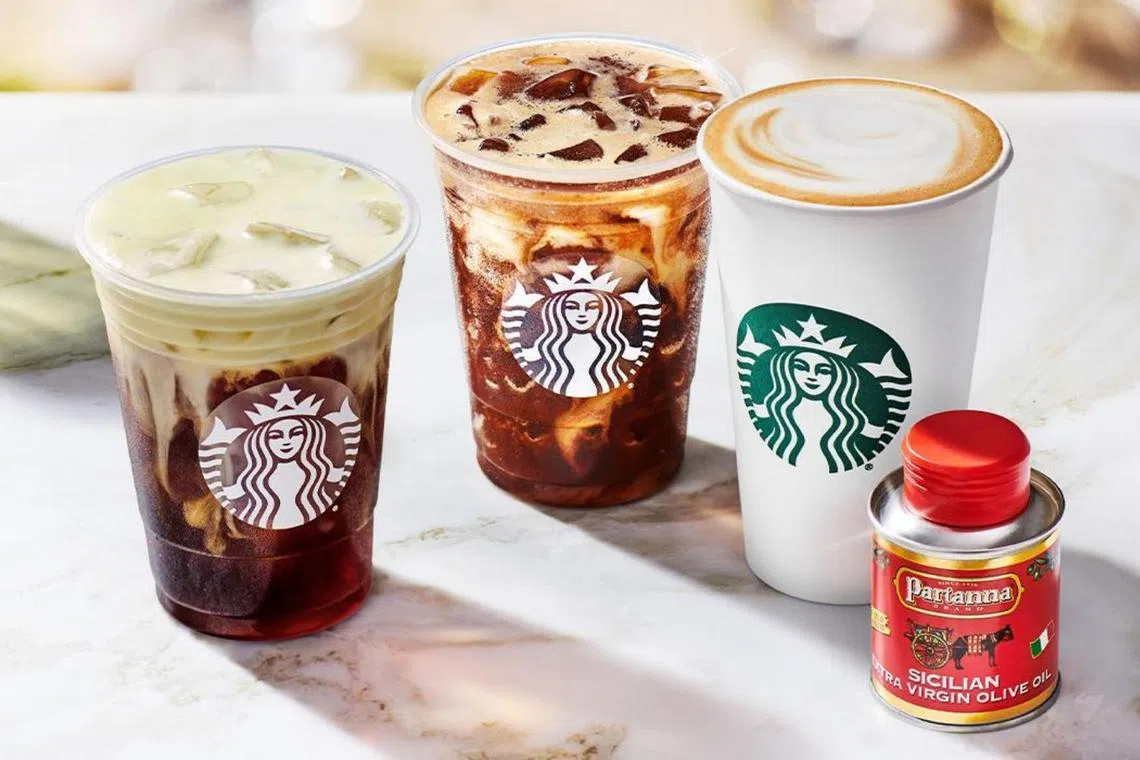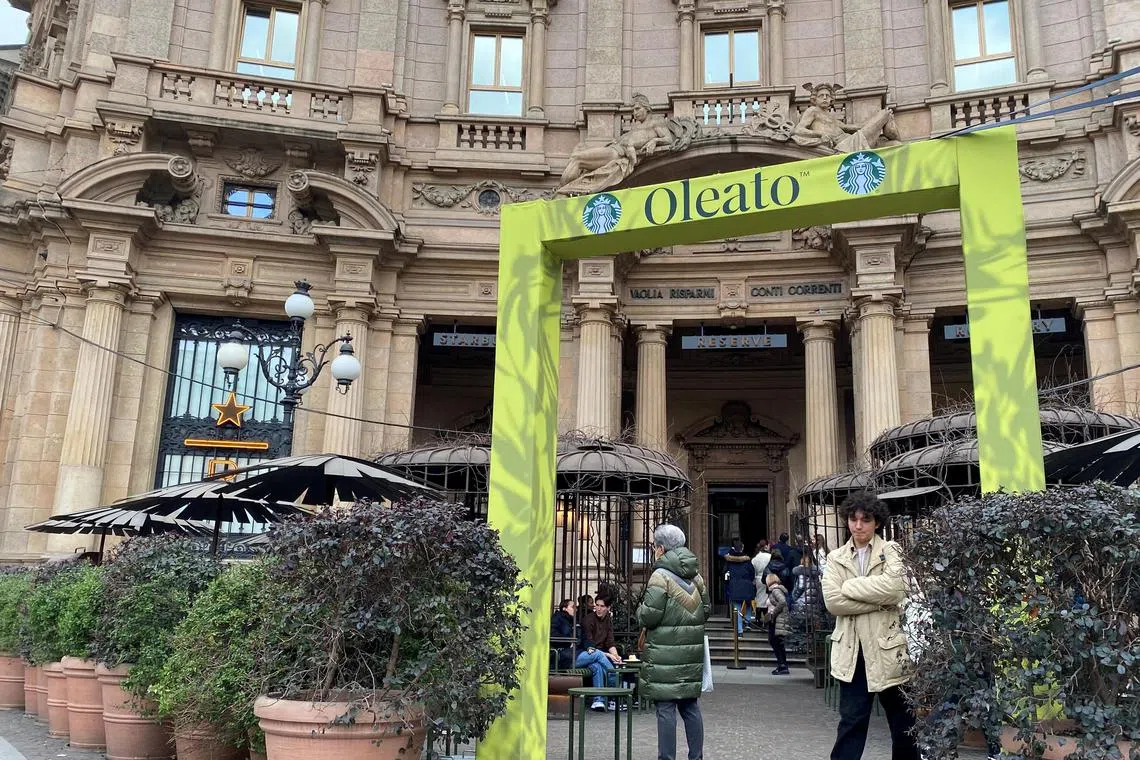Want that coffee with olive oil? Starbucks thinks Italians will
Sign up now: Get ST's newsletters delivered to your inbox

The new beverages, branded Oleato, debuted this week at an invitation-only dinner at the Starbucks Reserve Roastery in Milan on Tuesday.
PHOTO: STARBUCKS.COM
MILAN - Italians have rules about coffee. Cappuccino, for instance, is a morning drink, so do not try ordering it for an afternoon pick-me-up.
In most cafes, coffee is consumed standing at the counter, and variations are few, usually involving only the amount of water and/or milk to be added.
Still, Starbucks, which breaks all those rules with its long menu of options that are served at any time of day, opened in Italy in 2018 and has amassed a following.
On Wednesday, the company bet on Italy once more with a combination of two ingredients at the heart of the country’s food pyramid: coffee and olive oil.
The new beverages, branded Oleato, debuted this week at an invitation-only dinner (co-hosted with the National Chamber of Italian Fashion) at the Starbucks Reserve Roastery in Milan on Tuesday, the first day of Fashion Week. American singer Lizzo performed. Vogue’s top editor in America, Anna Wintour, attended.
On Wednesday, Oleato, which can mean oiled, oleate or greaseproof in Italian (and which is now trademarked by Starbucks), was introduced to the masses at the company’s flagship Italian venue in downtown Milan.
Five olive oil-infused beverages were on the menu, including the golden foam espresso martini, which concluded the dinner.
In an online introduction, Mr Howard Schultz, the founder of Starbucks, promoted the new coffee line as a “transformational idea” – his own – which came to him while he was travelling through Italy last summer.
He called it, glowingly, “a unique alchemy of two of nature’s most transcendent ingredients”.
Mr Schultz has been right about Italy before. Starbucks has opened more than 20 cafes there in just over four years.
“Italians have embraced Starbucks in a way that many did not see coming,” he said.
Other American ventures in Italy have not turned out well. In 2022, Domino’s Pizza bowed out of the Italian market for good, seven years after it bet that Italians would warm to having pineapple on their pizzas.
The steady line of customers waiting to be served at the Milan roastery on Tuesday suggested, at the very least, that adding olive oil to coffee may have generated some buzz. To be fair, people have been drinking coffee with butter for a while now.
Periodically, a server would float out the front door bearing a tray with small paper cups filled with Oleato samples to temper the wait, building expectations of the new delights inside.

A view of the Starbucks Reserve Roastery in Milan's city centre is seen with a banner advertising the new "Oleato" olive oil-infused coffee in Milan, on Feb 22, 2023.
PHOTO: REUTERS
Writing in La Stampa, food critic Lorenzo Cresci gave the “Oleato golden foam cold brew” a vote of 6.5 out of 10 and said that, “overall, it can be appreciated”.
He rated the cafe latte a seven, with “a strong flavour that leaves a pleasant taste in the mouth”. And he noted an orange flavour that dominated the Oleato iced cortado, giving it a 6.5.
As the Oleato was released only on Wednesday, it is too soon to know how a more representative group of Italians will feel about the oil-coffee combo.
Mr Denis Pantini, a food-sector specialist at the think-tank Nomisma, said he was curious about the product given that olive oil was taken for granted by Italians even though “every family has a bottle of olive oil in the kitchen”.
From a cultural point of view, olive oil, like wine and pasta, is “an ambassador of ‘made in Italy’”, he said, and associating with “a colossus like Starbucks” could improve the visibility of Italian olive oil producers.
In an e-mail, Ms Anna Cane, president of the olive oil group at Italian Association of the Edible Oil Industry, said that some olive oil producers are intrigued by the new horizons that could open from adding olive oil to coffee, “a very challenging innovation” that could relaunch olive oil’s image “especially among young people”.
That said, the association, known as Assitol, noted that olive oil had already migrated from the salad bowl to more innovative uses, including in panettone, the Italian Christmas cake, and cocktails like “drinkable pizza”, based on olive and tomato.
“Oil dream”, a cocktail using grapefruit and olive oil, is expected to be presented in 2023.
But not everyone is enthusiastic about the new products.
“On the one hand, it’s good, because people are speaking about coffee. On the other, it takes away a slice of the market, because if you’re drinking that product, you’re not drinking espresso,” said Mr Giorgio Caballini di Sassoferrato, the founder and president of a consortium that is trying to persuade Unesco to recognize espresso as part of the Intangible Cultural Heritage of Humanity.
Traditional Italian espresso is not just any coffee, the consortium claims.
“It’s a culture, a ritual, a social tradition,” Mr Caballini di Sassoferrato said.
“It’s not a product, it’s a system” in which class and financial status do not count.
For the most part, “rich or poor, people drink espresso in bars”.
It typically costs around €1 (S$1.40) or just above; Starbucks is considerably pricier.
Coffee with olive oil, on the other hand, left him “a bit perplexed”. NYTIMES


